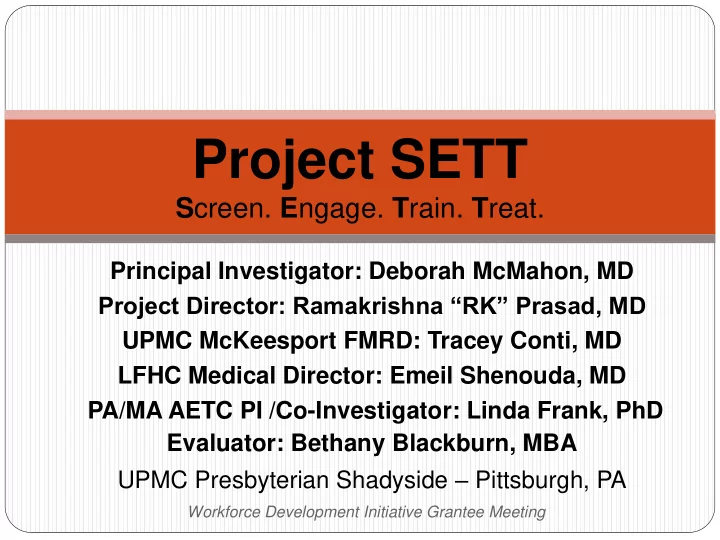

Project SETT S creen. E ngage. T rain. T reat. Principal Investigator: Deborah McMahon, MD Project Director: Ramakrishna “RK” Prasad, MD UPMC McKeesport FMRD: Tracey Conti, MD LFHC Medical Director: Emeil Shenouda, MD PA/MA AETC PI /Co-Investigator: Linda Frank, PhD Evaluator: Bethany Blackburn, MBA UPMC Presbyterian Shadyside – Pittsburgh, PA Workforce Development Initiative Grantee Meeting
Project Summary A HRSA- funded collaboration between UPMC’s Ryan White HIV/AIDS Program and Latterman Family Health Center (LFHC) to: Develop a sustainable medical education strategy to substantially increase HIV training in a community-based Family Medicine Residency Program Increase the number of physician assistants, family medicine residents, family medicine/psychiatry residents, medical students with HIV expertise through training, precepting, and mentoring Engage clinical staff in the delivery of HIV counseling and testing, HIV care, and care coordination in a medical home setting Provide effective co-management by HIV experts (shared EMR) Maximize AETC resources for HIV training
Geographic Location – Southwest PA Allegheny County : McKeesport, PA Disease burden Allegheny County (in red) is the 2 nd highest in PA both in terms of: the number of new HIV diagnoses; and, cumulative number of people living with HIV/AIDS Disparities McKeesport was noted among those: “In the lowest decile for educational attainment; highest in age adjusted mortality rates; and among the highest percent black population”* *Health Disparities: Education, Race, and Mortality, Gabriel D. Ajang, Allegheny County Health Department.
Project Setting LFHC McKeesport Number of patients: Former steelmaking center: 4000; 10 known HIV+ National Tube Works closed in ‘87 Annual visits: 12,525 ~ 20,000 pop’n : 55,000 in 1940 19 staff (Full/Part time) 72.2% white; 24.4% AA ~ 50% white; 50% AA 23% live under the FPL 80% on Medicaid Median household income: $31K Level 3 Patient- Centered Medical Home 112 HIV+ persons in care with Family Medicine McKeesport zip codes Residency Program Two zone bus ride LFHC offers multi-disciplinary primary care but lacks the clinic-wide expertise and some infrastructure to provide comprehensive HIV care independently.
SETT Project Logic Model LONG TERM OUTCOMES INPUTS OUTCOMES Increased HIV Community Viral Load LFHC Detection Suppression HAP: Clinical Clinical Training Expertise Increased Programs Engagement (FM*, PA, Psychiatry) AETC: Training Clinical: Increased Expertise NCQA Level 3 Medical Treatment Home ETAC: Technical Improved Access to 9 th Street Clinic Assistance Care for HIV Mon Yough Infected Individuals Community Services New Generation Reduction of HIV of HIV Providers Workforce Shortage
Practice Transformation Model: “SETT ” S CREEN: Routinize HIV testing in the practice E NGAGE: Increase staff and patient ability to discuss HIV and needed support services. T REAT: Expand the clinical knowledge and skills of LFHC providers and staff to treat HIV T RAIN: Create and fully integrate an HIV track in the clinical training programs and expand rotation opportunities to gain more experience with HIV+ individuals.
Implementation – Year 1 Training & Materials Challenges Cultural Competency Scheduling Clinical Training Synchronizing the training of the staff & Psychosocial Training providers with resident Co-morbidity Training and patient education Baseline assessment of Generating sufficient staff knowledge, attitudes, HIV patient volume in and organization’s the first year to practice capacity what has been taught
Year 1 Activities Progress to Date (10/15/14) Immediate Plans (thru 12/14) Grant Kick-Off Routinize HIV testing • Leadership Build HIV template in EMR • Grand-funded staff Conduct baseline evaluation • All staff Develop training schedule with • Residents AETC AETC registration Develop schedule of monthly Est. process for data HIV case conference collection Collaborate with Community Generating recruitment Partners interest on HIV training No additional staff were needed to begin this project .
Recommend
More recommend